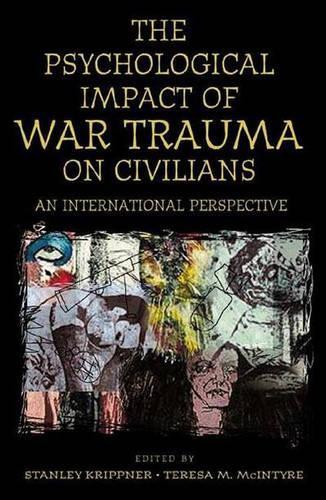
The Psychological Impact of War Trauma on Civilians: An International Perspective
(Hardback)
Publishing Details
The Psychological Impact of War Trauma on Civilians: An International Perspective
By (Author) Stanley Krippner
Edited by Maria McIntyre
Bloomsbury Publishing PLC
Praeger Publishers Inc
30th January 2003
United States
Classifications
Tertiary Education
Non Fiction
Occupational and industrial psychology
616.8521
Physical Properties
Hardback
344
Width 156mm, Height 235mm
652g
Description
In an interview granted years before September 11, 2001, Osama bin Laden has stated that he considers both soldiers and civilians of the enemy legitimate targets. That position is not unique, and the wars of the past century have proven with increasing numbers of civilian casualties. This book addresses the impact of war and extreme stress on civilian populations, as well as psychology's response to these phenomena. Contributors examined and developed interventions in locations including Africa, the Balkans, Afghanistan, Siberia, the Middle East, and Southeast Asia. Subjects include: women under the Taliban, AIDS patients faced with governmental denial, survivors of the Rwanda massacres, post-Pol Pot Cambodia, Nazi Holocaust victims, Kuwaitis after the Iraqi invasion, Argentine mothers of disappeared youth, and more. The authors examine such rehabilitation efforts as art therapy and role-playing in the former Yugoslavia, community mobilization in Angola, body-work for torture victims who have found their way to London, and counseling for former child prostitutes now in Vietnamese schools. Preventative measures include classes in ethnopolitical conflict resolution, reconciliation and peace-building activities, and the revival of indigenous practices after decades of repression.
Reviews
"No social scientist can afford to ignore this book because it is a guide for our role in the 21st century. This book not only illustrates many aspects of the problem, but ways in which we can provide assistance in these times of distress. This book is a door to the emerging maturity of the social sciences, providing a practical vision of what we may and can become. As such, it deserves a place in the library of every psychologist, psychiatrist, sociologist, anthropologist, and especially those who are therapists and caregivers."-Lawrence LeShan, Ph.D. Author, The Psychology of War
"Something has happened, within the lifetime of those born after the 1920s, regarding the human capacity to kill large numbers of people, to disrupt entire communities through organized acts of violence, and to wage war against civilians. We have left major portions of the world's populations scarred by these events, barely able to understand our collective inhumanity and sometimes frozen in our ability to respond. Healing is a profound and difficult undertaking. The approaches are as varied as the circumstances under which the victims described in this book were devastated, but the compassion and reflection in each chapter is remarkable. Krippner and McIntyre's book covers the range of most of the effective procedures used to treat the traumas of war. With healing comes the hope that the future need not repeat the horrors of the past. This collection is essential reading for those who would hope to understand how we can reweave humanity from the ravages of contemporary conflict."-Marc Pilisuk, Former President Society for the Study of Peace, Conflict and Violence American Psychological Association
"This book offers remarkable insights into the emotional experiences of people traumatized by war. Not only are a great range of survivors and disrupted cultures reported and analyzed, but the contributors take the necessary step, and offer a conceptual and practical framework for prevention and treatment. No other book comes close to such depth and breadth of understanding of the refugees, the civilians, the families, the women, and the children whose lives have been torn by terrorism and war."-Stanley L. Brodsky, Ph.D. Professor, University of Alabama, Tuscaloosa
"This volume is a contribution to the developing literature on the impact of war and extreme stress on civilian populations. Harrowing stories of survival are all faithfully retold within the context of colonization, racism, culture, and the occupation in which they took place. The question as to how to give appropriate clinical attention to these civilians is addressed in four parts. The case studies and assessment section casts a wide net over the opportunities for healing at both individual and communal levels. The section addresses not only the negative impacts of war on individuals, such as depression, anxiety, and post-traumatic stress, but it also investigates the legacy of warfare on a community level....[t]he work is extraordinary. I find myself extremely grateful for the research that has been conducted in this field which is so neglected, yet so sorely in need of attention."-The AHP Perspective Magazine
This volume is a contribution to the developing literature on the impact of war and extreme stress on civilian populations. Harrowing stories of survival are all faithfully retold within the context of colonization, racism, culture, and the occupation in which they took place. The question as to how to give appropriate clinical attention to these civilians is addressed in four parts. The case studies and assessment section casts a wide net over the opportunities for healing at both individual and communal levels. The section addresses not only the negative impacts of war on individuals, such as depression, anxiety, and post-traumatic stress, but it also investigates the legacy of warfare on a community level....[t]he work is extraordinary. I find myself extremely grateful for the research that has been conducted in this field which is so neglected, yet so sorely in need of attention.-The AHP Perspective Magazine
Author Bio
STANLEY KRIPPNER is Alan W. Watts Professor of Psychology at Saybrook Graduate School, San Francisco. TERESA M. MCINTYRE is Professor of Health Psychology at the University of Minho, Lago do Paco, Braga, Portugal.
